美国权利法案原文
美国权利法案原文

美国权利法案原文权利法案原文第一条Congress shall make no law respecting an establishment of religion, or prohibiting the free exercise thereof; or abridging the freedom of speech, or of the press; or the right of the people peaceably to assemble, and to petition the Government for a redress of grievances.译文:国会不得制定关于下列事项的法律:确立国教或禁止信教自由;剥夺言论自由或出版自由;或剥夺人民和平集会和向政府请愿伸冤的权利。
第二条A well regulated Militia being necessary to the security of a free State, the right of the people to keep and bear Arms shall not be infringed.译文:纪律严明的民兵是保障自由州的安全所必需的,人民持有和携带武器的权利不可侵犯。
第三条No Soldier shall, in time of peace be quartered in any house, without the consent of the Owner, nor in time of war, but in a manner to be prescribed by law.译文:未经房主同意,士兵平时不得驻扎在任何住宅;除依法律规定的方式,战时也不得驻扎。
第四条The right of the people to be secure in their persons, houses,papers, and effects, against unreasonable searches and seizures, shall not be violated, and no Warrants shall issue, but upon probable cause, supported by Oath or affirmation, and particularly describing the place to be searched, and the persons or things to be seized.译文:人民的人身、住宅、文件和财产不受无理搜查和扣押的权利,不得侵犯。
权利法案中英文版
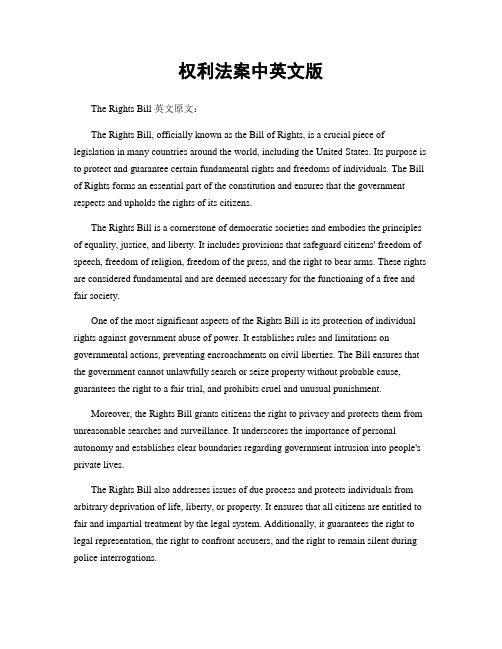
权利法案中英文版The Rights Bill 英文原文:The Rights Bill, officially known as the Bill of Rights, is a crucial piece of legislation in many countries around the world, including the United States. Its purpose is to protect and guarantee certain fundamental rights and freedoms of individuals. The Bill of Rights forms an essential part of the constitution and ensures that the government respects and upholds the rights of its citizens.The Rights Bill is a cornerstone of democratic societies and embodies the principles of equality, justice, and liberty. It includes provisions that safeguard citizens' freedom of speech, freedom of religion, freedom of the press, and the right to bear arms. These rights are considered fundamental and are deemed necessary for the functioning of a free and fair society.One of the most significant aspects of the Rights Bill is its protection of individual rights against government abuse of power. It establishes rules and limitations on governmental actions, preventing encroachments on civil liberties. The Bill ensures that the government cannot unlawfully search or seize property without probable cause, guarantees the right to a fair trial, and prohibits cruel and unusual punishment.Moreover, the Rights Bill grants citizens the right to privacy and protects them from unreasonable searches and surveillance. It underscores the importance of personal autonomy and establishes clear boundaries regarding government intrusion into people's private lives.The Rights Bill also addresses issues of due process and protects individuals from arbitrary deprivation of life, liberty, or property. It ensures that all citizens are entitled to fair and impartial treatment by the legal system. Additionally, it guarantees the right to legal representation, the right to confront accusers, and the right to remain silent during police interrogations.In addition to protecting individual rights, the Rights Bill also includes provisions regarding the rights of minority groups. It prohibits discrimination based on race, gender, religion, or sexual orientation. This ensures equal treatment and opportunities for all individuals within society.The Rights Bill is not without controversy. Some argue that certain rights guaranteed by the Bill of Rights may conflict with the greater good or national security. There are ongoing debates regarding the interpretation and application of these rights in specific situations. Balancing individual freedoms with collective interests remains a challenge for lawmakers and the judiciary.In conclusion, the Rights Bill plays a vital role in safeguarding the rights and freedoms of individuals in democratic societies. Its provisions protect citizens from government encroachment, ensure due process, and promote equality. The Bill of Rights symbolizes the commitment to a fair and just society, where every individual is entitled to basic human rights and liberties.。
简述权利法案的内容

简述权利法案的内容
权利法案的内容因国家而异,以美国和英国为例:
美国权利法案即《权利法案》,又译《人权法案》,是美国宪法中第一至第十条宪法修正案,由詹姆斯·麦迪逊起草,1791年12月15日,获得通过。
权利法案的10条修正案包括:第一条:言论、宗教、和平集会自由;第二条:持有与佩戴武器的权利;第三条:免于民房被军队征用;第四条:免于不合理的搜查与扣押;第五条:正当程序(Due Process)、一罪不能两判、禁止逼供、禁止剥夺私人财产;第六条:未经陪审团不可定罪以及剥夺被控告方的其他权利;第七条:民事案件中要求陪审团的权利;第八条:禁止过度罚金与酷刑;第九条:未被列入的其他权利同样可以受到保护;第十条:人民保留未经立法的权利。
英国《权利法案》全称《国民权利与自由和王位继承宣言》,是英国资产阶级革命中的重要法律性文件,但非是宪法。
其内容并不多,只有十三条。
以上内容仅供参考,建议查阅关于权利法案的书籍或者咨询历史学家,以获取更准确的信息。
英 美权利法案

The Bill of Rights,即《权利法案》,又译《人权法案》,指的是美国宪法中第一至第十条宪法修正案,由詹姆斯·麦迪逊起草,1791年12月15日,获得通过。
权利法案的10条修正案包括:第一条:言论、宗教、和平集会自由;第二条:持有与佩戴武器的权利;第三条:免于民房被军队征用;第四条:免于不合理的搜查与扣押;第五条:正当程序(Due Process)、一罪不能两判、禁止逼供、禁止剥夺私人财产;第六条:未经陪审团不可定罪以及剥夺被控告方的其他权利;第七条:民事案件中要求陪审团的权利;第八条:禁止过度罚金与酷刑;第九条:未被列入的其他权利同样可以受到保护;第十条:人民保留未经立法的权利。
影响与评价《权利法案》的第一条,即美国宪法第一修正案对美国影响巨大。
美国媒体所享有的一切自由都源于此,在美国,凡是涉及言论、新闻、出版等诉讼,往往都会搬出此,它几乎成为美国媒体或个人言论自由的护身符,不可动摇。
以至于美国人把它颂扬为“美国生活方式”的主要内容。
[1]但是《权利法案》没有修正宪法的一个重大缺陷,即对奴隶制的确认,这使后来的南方地区农奴制扩张大大增长。
[2]第一条(Amendment I)Congress shall make no law respecting an establishment of religion, or prohibiting the free exercise thereof; or abridging the freedom of speech, or of the press; or the right of the people peaceably to assemble, and to petition the Government for a redress of grievances.译文:国会不得制定关于下列事项的法律:确立国教或禁止信教自由;剥夺言论自由或出版自由;或剥夺人民和平集会和向政府请愿伸冤的权利。
美国独立宣言-权利法案-宪法
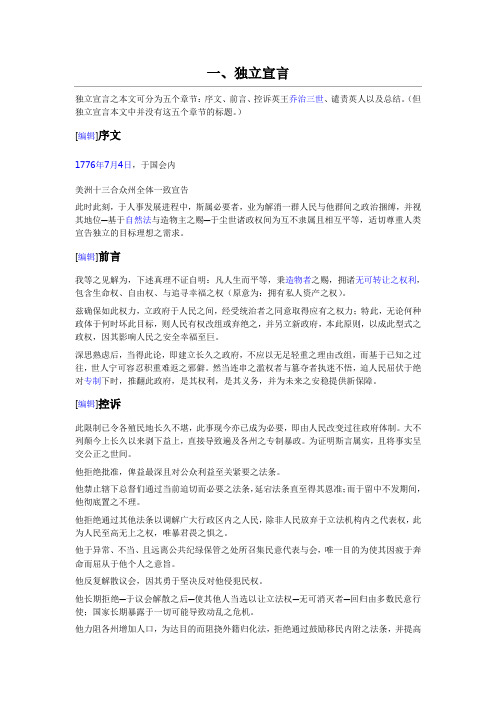
一、独立宣言独立宣言之本文可分为五个章节:序文、前言、控诉英王乔治三世、谴责英人以及总结。
(但独立宣言本文中并没有这五个章节的标题。
)[编辑]序文1776年7月4日,于国会内美洲十三合众州全体一致宣告此时此刻,于人事发展进程中,斯属必要者,业为解消一群人民与他群间之政治捆缚,并视其地位─基于自然法与造物主之赐─于尘世诸政权间为互不隶属且相互平等,适切尊重人类宣告独立的目标理想之需求。
[编辑]前言我等之见解为,下述真理不证自明:凡人生而平等,秉造物者之赐,拥诸无可转让之权利,包含生命权、自由权、与追寻幸福之权(原意为:拥有私人资产之权)。
兹确保如此权力,立政府于人民之间,经受统治者之同意取得应有之权力;特此,无论何种政体于何时坏此目标,则人民有权改组或弃绝之,并另立新政府,本此原则,以成此型式之政权,因其影响人民之安全幸福至巨。
深思熟虑后,当得此论,即建立长久之政府,不应以无足轻重之理由改组,而基于已知之过往,世人宁可容忍积重难返之邪僻。
然当连串之滥权者与篡夺者执迷不悟,迫人民屈伏于绝对专制下时,推翻此政府,是其权利,是其义务,并为未来之安稳提供新保障。
[编辑]控诉此限制已令各殖民地长久不堪,此事现今亦已成为必要,即由人民改变过往政府体制。
大不列颠今上长久以来剥下益上,直接导致遍及各州之专制暴政。
为证明斯言属实,且将事实呈交公正之世间。
他拒绝批准,俾益最深且对公众利益至关紧要之法条。
他禁止辖下总督们通过当前迫切而必要之法条,延宕法条直至得其恩准;而于留中不发期间,他彻底置之不理。
他拒绝通过其他法条以调解广大行政区内之人民,除非人民放弃于立法机构内之代表权,此为人民至高无上之权,唯暴君畏之惧之。
他于异常、不当、且远离公共纪绿保管之处所召集民意代表与会,唯一目的为使其因疲于奔命而屈从于他个人之意旨。
他反复解散议会,因其勇于坚决反对他侵犯民权。
他长期拒绝─于议会解散之后─使其他人当选以让立法权─无可消灭者─回归由多数民意行使;国家长期暴露于一切可能导致动乱之危机。
权利法案原文

权利法案原文第一条 Amendment ICongress shall make no law respecting an establishment of religion, or prohibiting the free exercise thereof; or abridging the freedom of speech, or of the press; or the right of the people peaceably to assemble, and to petition the Government for a redress of grievances.译文:国会不得制定关于下列事项的法律:确立国教或禁止信教自由;剥夺言论自由或出版自由;或剥夺人民和平集会和向政府请愿伸冤的权利。
[编辑]第二条 Amendment IIA well regulated Militia, being necessary to the security of a free State, the right of the people to keep and bear Arms, shall not be infringed.译文:纪律严明的民兵是保障自由州的安全所必需的,人民持有和携带武器的权利不得侵犯。
[编辑]第三条 Amendment IIINo Soldier shall, in time of peace be quartered in any house, without the consent of the Owner, nor in time of war, but in a manner to be prescribed by law.译文:未经房主同意,士兵平时不得驻扎在任何住宅;除依法律规定的方式,战时也不得驻扎。
[编辑]第四条 Amendment IVThe right of the people to be secure in their persons, houses, papers, and effects, against unreasonable searches and seizures, shall not be violated, and no Warrants shall issue, but upon probable cause, supported by Oath or affirmation, and particularly describing the place to be searched, and the persons or things to be seized.译文:人民的人身、住宅、文件和财产不受无理搜查和扣押的权利,不得侵犯。
(美国权利法案 美国宪法的十项原始修正案)The United States Bill of Rights

End of the Project Gutenberg etext of The United States Bill of Rights
V
No person shall be held to answer for a capital, or otherwise infamous crime, unless on a presentment or indictment of a Grand Jury, except in cases arising in the land or naval forces, or in the Militia, when in actual service in time of War
VI
In all criminal prosecutions, the accused shall enjoy the right to a speedy and public trial, by an impartial jury of the State and district wherein the crime shall have been committed, which district shall have been previously ascertained by law, and to be informed of the nature and cause of the accusation; to be confronted with the witnesses against him; to have compulsory process for obtaining witnesses in his favor, and to have the assistance of counsel for his defense.
权利法案的简介及影响
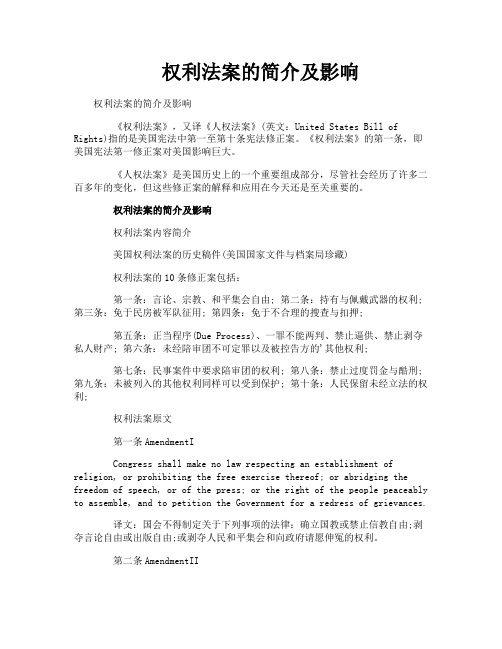
权利法案的简介及影响权利法案的简介及影响《权利法案》,又译《人权法案》(英文:United States Bill of Rights)指的是美国宪法中第一至第十条宪法修正案。
《权利法案》的第一条,即美国宪法第一修正案对美国影响巨大。
《人权法案》是美国历史上的一个重要组成部分,尽管社会经历了许多二百多年的变化,但这些修正案的解释和应用在今天还是至关重要的。
权利法案的简介及影响权利法案内容简介美国权利法案的历史稿件(美国国家文件与档案局珍藏)权利法案的10条修正案包括:第一条:言论、宗教、和平集会自由; 第二条:持有与佩戴武器的权利; 第三条:免于民房被军队征用; 第四条:免于不合理的搜查与扣押;第五条:正当程序(Due Process)、一罪不能两判、禁止逼供、禁止剥夺私人财产; 第六条:未经陪审团不可定罪以及被控告方的'其他权利;第七条:民事案件中要求陪审团的权利; 第八条:禁止过度罚金与酷刑; 第九条:未被列入的其他权利同样可以受到保护; 第十条:人民保留未经立法的权利;权利法案原文第一条AmendmentICongress shall make no law respecting an establishment of religion, or prohibiting the free exercise thereof; or abridging the freedom of speech, or of the press; or the right of the people peaceably to assemble, and to petition the Government for a redress of grievances.译文:国会不得制定关于下列事项的法律:确立国教或禁止信教自由;剥夺言论自由或出版自由;或剥夺人民和平集会和向政府请愿伸冤的权利。
第二条AmendmentIIA well regulated Militia being necessary to the security of a free State, the right of the people to keep and bear Arms shall not be infringed.译文:纪律严明的民兵是保障自由州的安全所必需的,人民持有和携带武器的权利不可侵犯。
权利法案原文及译文:
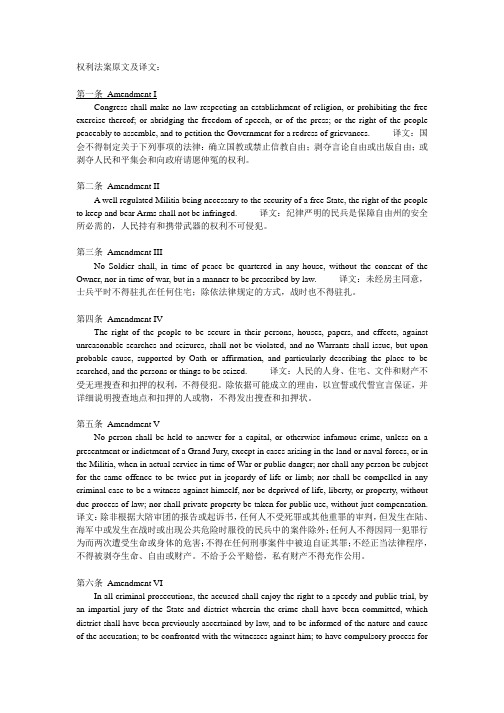
权利法案原文及译文:第一条Amendment ICongress shall make no law respecting an establishment of religion, or prohibiting the free exercise thereof; or abridging the freedom of speech, or of the press; or the right of the people peaceably to assemble, and to petition the Government for a redress of grievances. 译文:国会不得制定关于下列事项的法律:确立国教或禁止信教自由;剥夺言论自由或出版自由;或剥夺人民和平集会和向政府请愿伸冤的权利。
第二条Amendment IIA well regulated Militia being necessary to the security of a free State, the right of the people to keep and bear Arms shall not be infringed. 译文:纪律严明的民兵是保障自由州的安全所必需的,人民持有和携带武器的权利不可侵犯。
第三条Amendment IIINo Soldier shall, in time of peace be quartered in any house, without the consent of the Owner, nor in time of war, but in a manner to be prescribed by law. 译文:未经房主同意,士兵平时不得驻扎在任何住宅;除依法律规定的方式,战时也不得驻扎。
第四条Amendment IVThe right of the people to be secure in their persons, houses, papers, and effects, against unreasonable searches and seizures, shall not be violated, and no Warrants shall issue, but upon probable cause, supported by Oath or affirmation, and particularly describing the place to be searched, and the persons or things to be seized. 译文:人民的人身、住宅、文件和财产不受无理搜查和扣押的权利,不得侵犯。
权利法案中英文版

权利法案中英文版Title: The Bill of Rights (English and Chinese Versions)Introduction:The Bill of Rights is a pivotal document that ensures the protection of individual rights and liberties. This article presents an English and Chinese version of the Bill of Rights, highlighting its significance and impact on society.Section 1: BackgroundThe Bill of Rights is a set of amendments to the United States Constitution, introduced and adopted in 1791. It guarantees fundamental rights such as freedom of speech, religion, and assembly. This section provides a brief overview of the historical context and importance of the Bill of Rights.Section 2: English VersionThe following is the English translation of the Bill of Rights:Amendment I:Congress shall make no law respecting an establishment of religion, or prohibiting the free exercise thereof; or abridging the freedom of speech, or of the press; or the right of the people peaceably to assemble, and to petition the Government for a redress of grievances.Amendment II:A well-regulated Militia, being necessary to the security of a free State, the right of the people to keep and bear Arms, shall not be infringed.[Continuation of Amendments III - X in English version]Section 3: Chinese VersionNow, we present the Chinese translation of the Bill of Rights:修正案第一条:国会不得制定任何有关建立宗教、禁止其自由行使,或者限制言论自由、新闻出版自由,或者限制人们和平集会和向政府请愿的法律。
权利法案
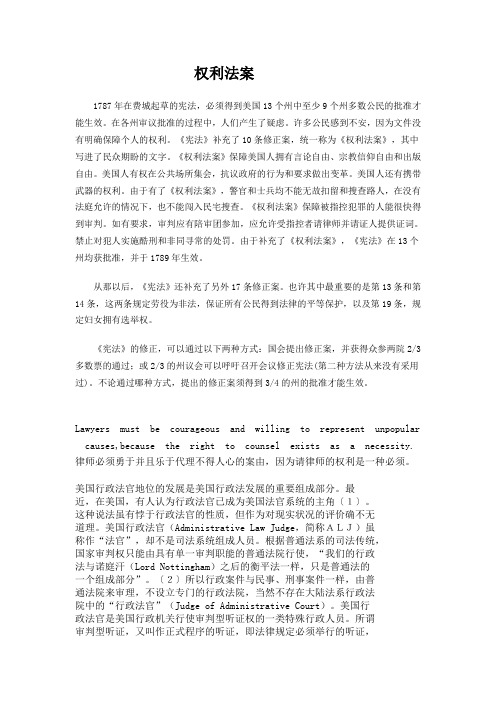
权利法案1787年在费城起草的宪法,必须得到美国13个州中至少9个州多数公民的批准才能生效。
在各州审议批准的过程中,人们产生了疑虑。
许多公民感到不安,因为文件没有明确保障个人的权利。
《宪法》补充了10条修正案,统一称为《权利法案》,其中写进了民众期盼的文字。
《权利法案》保障美国人拥有言论自由、宗教信仰自由和出版自由。
美国人有权在公共场所集会,抗议政府的行为和要求做出变革。
美国人还有携带武器的权利。
由于有了《权利法案》,警官和士兵均不能无故扣留和搜查路人,在没有法庭允许的情况下,也不能闯入民宅搜查。
《权利法案》保障被指控犯罪的人能很快得到审判。
如有要求,审判应有陪审团参加,应允许受指控者请律师并请证人提供证词。
禁止对犯人实施酷刑和非同寻常的处罚。
由于补充了《权利法案》,《宪法》在13个州均获批准,并于1789年生效。
从那以后,《宪法》还补充了另外17条修正案。
也许其中最重要的是第13条和第14条,这两条规定劳役为非法,保证所有公民得到法律的平等保护,以及第19条,规定妇女拥有选举权。
《宪法》的修正,可以通过以下两种方式:国会提出修正案,并获得众参两院2/3多数票的通过;或2/3的州议会可以呼吁召开会议修正宪法(第二种方法从来没有采用过)。
不论通过哪种方式,提出的修正案须得到3/4的州的批准才能生效。
Lawyers must be courageous and willing to represent unpopular causes, because the right to counsel exists as a necessity.律师必须勇于并且乐于代理不得人心的案由,因为请律师的权利是一种必须。
美国行政法官地位的发展是美国行政法发展的重要组成部分。
最近,在美国,有人认为行政法官已成为美国法官系统的主角〔1〕。
这种说法虽有悖于行政法官的性质,但作为对现实状况的评价确不无道理。
美国行政法官(Administrative Law Judge,简称ALJ)虽称作“法官”,却不是司法系统组成人员。
the Bill of Rights 美国权利法案

Feel Free to SayThere is a famous quote said by Voltaire, “I disapprove of what you say, but I will defend to the death your right to say it.” These are the best words to impress on us how important the freedom of speech and press is. Historically, it is hard to ignore the far-reaching implications for the U.S. created by Amendment I from the Bill of Rights.The great law is to protect the right of every single identity including individuals and organizations to express his or its ideas by any unharmful action, not only the words. For example, there was a case that three children prosecuted their school for punishing their wearing black veils in order to be against the Vietnam War in 1965. In the end, the court also used Amendment I from the Bill of Rights to explain these children’s actions were legal. It was famous because it showed everyone has the right given by the Bill of Rights to express their ways more than words. What’s more, why does Amendment I from the Bill of Rights make us live better?The point is it protects opportunities to voice different opinions or ideas, which limits any power around us and provide unlimited resources to improve the society. It should have far-reaching implications because it is the basic human right for everyone.Amendment I from the Bill of Rights is a great law that makes our society beautiful. As those great legislators did two hundred years ago, every great judge will use it to finish his mission to protect people, and it will prevent the U.S. people from any violation of freedom behaviors in the future.。
美国的权力法案(1787)

美国的权力法案(1787)
美国宪法包括一个“权利法案”
具体内容是:
不设立国教,宗教信仰自由
言论自由
出版自由
和平集会自由
向政府伸冤的自由
人民有携带枪支武器的权力
这样规定是为了保障国家安全和公民权力
和平时期,士兵不得居住民房
战争时期,士兵不得自行占居民房
保障人身、住所、文件、财物的安全
不得随意扣押财物、拘捕公民
不得强迫公民自认其罪
如果没有合理的赔偿方案,私有财产不得征用
被告有权要求在罪案发生地审理
被告有权要求公正的陪审团
被告有权要求迅速及公开的审理
被告有权获知被控罪名和理由
被告有权与原告的证人对质
被告有权要求以强制手段让对被告有利的证人出庭作证被告有权要求律师辩护
不得要求过重的保释金
权力法案是合众国宪法的一部分。
权利法案1791

权利法案(美国)(中英文)东方法眼按:1787年在费城起草的宪法,在各州审议批准的过程中,也有不少美国公民感到不安,因为宪法中并没有明确保障个人的权利。
因此,《宪法》补充了10条修正案,统一称为《权利法案》,英文叫The Bill of Rights。
由于补充了《权利法案》,《宪法》在13个州均获批准,并于1791年生效。
第一条Amendment ICongress shall make no law respecting an establishment of religion, or prohibiting the free exercise thereof; or abridging the freedom of speech, or of the press; or the right of the people peaceably to assemble, and to petition the Government for a redress of grievances.译文:国会不得制定关于下列事项的法律:确立国教或禁止信教自由;剥夺言论自由或出版自由;或剥夺人民和平集会和向政府请愿伸冤的权利。
第二条Amendment IIA well regulated Militia, being necessary to the security of a free State, the right of the people to keep and bear Arms, shall not be infringed.译文:纪律严明的民兵是保障自由州的安全所必需的,人民持有和携带武器的权利不可侵犯。
第三条Amendment IIINo Soldier shall, in time of peace be quartered in any house, without the consent of the Owner, nor in time of war, but in a manner to be prescribed by law.译文:未经房主同意,士兵平时不得驻扎在任何住宅;除依法律规定的方式,战时也不得驻扎。
权利法案中英文版

权利法案(Bill of Rights)通常指的是特定国家的法律文件,它旨在保障公民的基本自由和权利不受政府侵犯。
以下是英国和美国各自的权利法案中英文对照概述:英国《权利法案》(1689年)中文标题:国民权利与自由和王位继承宣言英文全称:An Act Declaring the Rights and Liberties of the Subject and Settling the Succession of the Crown内容摘要:确立了议会至上的原则,限制国王的权力。
保障了宗教自由、言论自由和请愿权等基本权利。
规定国王必须定期召开议会,并且未经议会同意不得征税或维持常备军。
美国《权利法案》(1791年)英文名称:The Bill of Rights内容摘要:1. 第一条修正案:保障信仰、言论、出版、集会、请愿的自由。
2. 第二条修正案:保障人民持有并携带武器的权利。
3. 第三条修正案:禁止在和平时期无住宅主人同意的情况下驻扎士兵。
4. 第四条修正案:禁止非法搜查和扣押,除非有合理的理由和搜查令。
5. 第五条修正案:保障正当程序,包括不经合法程序不得剥夺生命、自由或财产;禁止双重危险及强迫自证其罪。
6. 第六条修正案:规定刑事审判中的各项权利,如迅速公开审判、由犯罪行为发生地的州和区公正陪审团审判、被告知指控详情、面对证人和获取律师帮助的权利等。
7. 第七条修正案:民事诉讼中,当案件涉及金额超过一定数额时,享有由陪审团审判的权利。
8. 第八条修正案:禁止施加过重的保释金、罚款以及残酷和非常规的惩罚。
9. 第九条修正案:保留未明确列举于宪法但属于人民的权利。
10. 第十条修正案:保留给各州或人民的那些未被宪法授予联邦政府、也未禁止各州行使的所有权力。
以上为简要概括,具体条款内容需查阅相关法律文本以获得详尽信息。
美国病人权利法案

美国病人权利法案美国《病人权利法案》(Patients Bill of Rights)指出,当你是个病人,你有下列的权利:一、你有权利接受妥善而有尊严的治疗。
二、你有权利要求自己或你的亲友能得到:(以你所能理解的方式)有关自己的诊断、治疗方式及预后的情况。
你也有权利知道为你医疗的人员名字。
三、你有权利在任何医疗开始前,了解并决定是否签写「同意书」(informed consent),除了紧急处理外,一般同意书的内容应包括以浅显易懂的文句介绍医疗程序的本质、预期的危险性及益处、不同意时的后果、有无其它可选择的医疗方式、且同意是你「自愿」的。
四、你有权利拒绝治疗(refusal to treatment)。
五、你有权利保持你的「隐私」(privacy)。
六、你有权利使你的沟通及纪录保持「机密」。
七、你有权利要求医院在能力范围内对你所要求的服务做出合理的响应。
而医院在紧急时,必须提供评估,服务及转诊。
在情况允许下,转诊之前,你有权利得到你全部的病历资料及解释。
八、你有权利获知医院之间的关系及治疗你医疗人员的专业资料。
九、你有权利被告知,你被进行人体试验或临床研究;且你有权利拒绝。
十、你有权利要求合理的持续照顾(cotinuity of care)。
十一、你有权利知道你的账单,并检查内容或要求院方解释。
十二、你有权利知道医院的规则以及病人的行为规范。
对于病人应有的权利,你可以主动争取而不被忽略。
附:医学伦理理法则:自主(Autonomy)、帮助(Beneficence)、无害(No-maleficence)及正义(Justice)。
一、自主原则当你有决定的能力(decisional capability)时,你有权利自我决定及规划生涯。
并决定是否接受治疗,即使在濒死之前、或意识不清时,你的代理人有权决定你的治疗,或以你的遗嘱(Living Will)来表明你的决定。
二、帮助原则医疗的主要目的在协助病人保持生命(Preserving Life),恢复健康(Restoring Health),减少痛苦(Relieving Sufering)和恢复及维持功能(Restoring or Maintaining Function)。
03权利法案(美国宪法第一至第十条修正案)
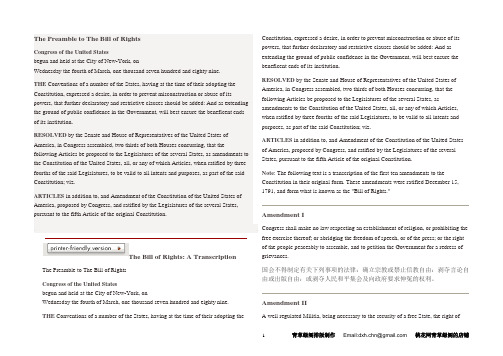
The Preamble to The Bill of RightsCongress of the United Statesbegun and held at the City of New-York, onWednesday the fourth of March, one thousand seven hundred and eighty nine.THE Conventions of a number of the States, having at the time of their adopting the Constitution, expressed a desire, in order to prevent misconstruction or abuse of its powers, that further declaratory and restrictive clauses should be added: And as extending the ground of public confidence in the Government, will best ensure the beneficent ends of its institution.RE SOLVED by the Senate and House of Representatives of the United States of America, in Congress assembled, two thirds of both Houses concurring, that the following Articles be proposed to the Legislatures of the several States, as amendments to the Constitution of the United States, all, or any of which Articles, when ratified by three fourths of the said Legislatures, to be valid to all intents and purposes, as part of the said Constitution; viz.ARTICLE S in addition to, and Amendment of the Constitution of the United States of America, proposed by Congress, and ratified by the Legislatures of the several States, pursuant to the fifth Article of the original Constitution.The Bill of Rights: A TranscriptionThe Preamble to The Bill of RightsCongress of the United Statesbegun and held at the City of New-York, onWednesday the fourth of March, one thousand seven hundred and eighty nine.THE Conventions of a number of the States, having at the time of their adopting the Constitution, expressed a desire, in order to prevent misconstruction or abuse of its powers, that further declaratory and restrictive clauses should be added: And as extending the ground of public confidence in the Government, will best ensure the beneficent ends of its institution.RE SOLVED by the Senate and House of Representatives of the United States of America, in Congress assembled, two thirds of both Houses concurring, that the following Articles be proposed to the Legislatures of the several States, as amendments to the Constitution of the United States, all, or any of which Articles, when ratified by three fourths of the said Legislatures, to be valid to all intents and purposes, as part of the said Constitution; viz.ARTICLE S in addition to, and Amendment of the Constitution of the United States of America, proposed by Congress, and ratified by the Legislatures of the several States, pursuant to the fifth Article of the original Constitution.Note: The following text is a transcription of the first ten amendments to the Constitution in their original form. These amendments were ratified December 15, 1791, and form what is known as the "Bill of Rights."Amendment ICongress shall make no law respecting an establishment of religion, or prohibit ing the free exercise thereof; or abridging the freedom of speech, or of the press; or the right of the people peaceably to assemble, and to petition the Government for a redress of grievances.国会不得制定有关下列事项的法律:确立宗教或禁止信教自由:剥夺言论自由或出版自由:或剥夺人民和平集会及向政府要求伸冤的权利。
平等权利法案
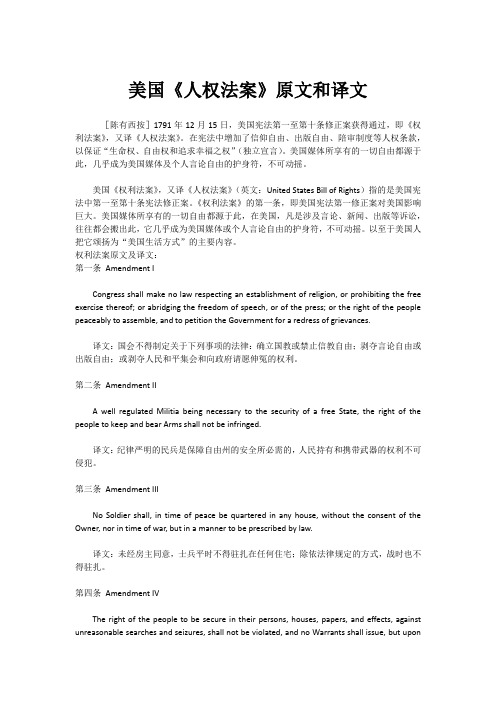
美国《人权法案》原文和译文[陈有西按]1791年12月15日,美国宪法第一至第十条修正案获得通过,即《权利法案》,又译《人权法案》。
在宪法中增加了信仰自由、出版自由、陪审制度等人权条款,以保证“生命权、自由权和追求幸福之权”(独立宣言)。
美国媒体所享有的一切自由都源于此,几乎成为美国媒体及个人言论自由的护身符,不可动摇。
美国《权利法案》,又译《人权法案》(英文:United States Bill of Rights)指的是美国宪法中第一至第十条宪法修正案。
《权利法案》的第一条,即美国宪法第一修正案对美国影响巨大。
美国媒体所享有的一切自由都源于此,在美国,凡是涉及言论、新闻、出版等诉讼,往往都会搬出此,它几乎成为美国媒体或个人言论自由的护身符,不可动摇。
以至于美国人把它颂扬为“美国生活方式”的主要内容。
权利法案原文及译文:第一条Amendment ICongress shall make no law respecting an establishment of religion, or prohibiting the free exercise thereof; or abridging the freedom of speech, or of the press; or the right of the people peaceably to assemble, and to petition the Government for a redress of grievances.译文:国会不得制定关于下列事项的法律:确立国教或禁止信教自由;剥夺言论自由或出版自由;或剥夺人民和平集会和向政府请愿伸冤的权利。
第二条Amendment IIA well regulated Militia being necessary to the security of a free State, the right of the people to keep and bear Arms shall not be infringed.译文:纪律严明的民兵是保障自由州的安全所必需的,人民持有和携带武器的权利不可侵犯。
权利法案(美国)-the Bill of Rights(中英文)

权利法案(美国)(中英文)1787年在费城起草的宪法,在各州审议批准的过程中,也有不少美国公民感到不安,因为宪法中并没有明确保障个人的权利。
因此,《宪法》补充了10条修正案,统一称为《权利法案》,英文叫The Bill of Rights。
由于补充了《权利法案》,《宪法》在13个州均获批准,并于1789年生效。
(左下图:美国威廉姆斯堡总督府的一个小会议室,就是《弗吉尼亚州权利法案》-后来成为美国宪法中《权利法案》蓝本的制定地) 第一条 Amendment II . F reedom of Speech, Press, Religion and Petition Congress shall make no law respecting an establishment of religion, or prohibiting the free exercise thereof; or abridging the freedom of speech, or of the press; or the right of the people peaceably to assemble, and to petition the Government for a redress of grievances. 译文:国会不得制定关于下列事项的法律:确立国教或禁止信教自由;剥夺言论自由或出版自由;或剥夺人民和平集会和向政府请愿伸冤的权利。
第二条 Amendment IIII . Right to keep and bear arms A well regulated Militia, being necessary to the security of a free State, the right of the people to keep and bear Arms, shall not be infringed. 译文:纪律严明的民兵是保障自由州的安全所必需的,人民持有和携带武器的权利不可侵犯。
- 1、下载文档前请自行甄别文档内容的完整性,平台不提供额外的编辑、内容补充、找答案等附加服务。
- 2、"仅部分预览"的文档,不可在线预览部分如存在完整性等问题,可反馈申请退款(可完整预览的文档不适用该条件!)。
- 3、如文档侵犯您的权益,请联系客服反馈,我们会尽快为您处理(人工客服工作时间:9:00-18:30)。
权利法案原文
第一条
Congress shall make no law respecting an establishment of religion, or prohibiting the free exercise thereof; or abridging the freedom of speech, or of the press; or the right of the people peaceably to assemble, and to petition the Government for a redress of grievances.
译文:国会不得制定关于下列事项的法律:确立国教或禁止信教自由;
剥夺言论自由或出版自由;或剥夺人民和平集会和向政府请愿伸冤的
权利。
第二条
A well regulated Militia being necessary to the security of a free State, the right of the people to keep and bear Arms shall not be infringed.
译文:纪律严明的民兵是保障自由州的安全所必需的,人民持有和携
带武器的权利不可侵犯。
第三条
No Soldier shall, in time of peace be quartered in any house, without the consent of the Owner, nor in time of war, but in a manner to be prescribed by law.
译文:未经房主同意,士兵平时不得驻扎在任何住宅;除依法律规定
的方式,战时也不得驻扎。
第四条
The right of the people to be secure in their persons, houses, papers, and effects, against unreasonable searches and seizures, shall not be violated, and no Warrants shall issue, but upon probable cause, supported by Oath or affirmation, and particularly describing the place to be searched, and the persons or things to be seized.
译文:人民的人身、住宅、文件和财产不受无理搜查和扣押的权利,不得侵犯。
除依据可能成立的理由,以宣誓或代誓宣言保证,并详细
说明搜查地点和扣押的人或物,否则不得发出搜查和扣押状。
第五条
No person shall be held to answer for a capital, or otherwise infamous
crime, unless on a presentment or indictment of a Grand Jury, except in cases arising in the land or naval forces, or in the Militia, when in actual service in time of War or public danger; nor shall any person be subject for the same offence to be twice put in jeopardy of life or limb; nor shall be compelled in any criminal case to be a witness against himself, nor be deprived of life, liberty, or property, without due process of law; nor shall private property be taken for public use, without just compensation.
译文:除非根据大陪审团的报告或起诉书,任何人不受死罪或其他重
罪的审判,但发生在陆、海军中或发生在战时或出现公共危险时服役
的民兵中的案件除外;任何人不得因同一犯罪行为而两次遭受生命或
身体的危害;不得在任何刑事案件中被迫自证其罪;不经正当法律程
序,不得被剥夺生命、自由或财产。
不给予公平赔偿,私有财产不得
充作公用。
第六条
In all criminal prosecutions, the accused shall enjoy the right to a speedy and public trial, by an impartial jury of the State and district wherein the crime shall have been committed, which district shall have been previously ascertained by law, and to be informed of the nature and cause of the accusation; to be confronted with the witnesses against him; to have compulsory process for obtaining witnesses in his favor, and to have the Assistance of Counsel for his defence.
译文:在一切刑事诉讼中,被告有权由犯罪行为发生地的州和地区的
公正陪审团予以迅速和公开的审判,该地区应事先已由法律确定;得
知控告的性质和理由;同原告证人对质;以强制程序取得对其有利
的证人;并取得律师帮助为其辩护。
第七条
In suits at common law, where the value in controversy shall exceed twenty dollars, the right of trial by jury shall be preserved, and no fact tried by a jury, shall be otherwise reexamined in any Court of the United States, than according to the rules of the common law.
译文:在普通法的诉讼中,其争执价额超过二十美元,由陪审团审判
的权利应受到保护。
由陪审团裁决的事实,合众国的任何法院除非按
照习惯法规则,不得重新审查。
第八条
Excessive bail shall not be required, nor excessive fines imposed,
nor cruel and unusual punishments inflicted.
译文:不得要求过多的保释金,不得处以过重的罚金,不得施加残酷
和非常的惩罚。
第九条
The enumeration in the Constitution, of certain rights, shall not be construed to deny or disparage others retained by the people.
译文:本宪法对某些权利的列举,不得被解释为否定或轻视由人民保
留的其他权利。
第十条
The powers not delegated to the United States by the Constitution, nor prohibited by it to the States, are reserved to the States respectively, or to the people.
译文:宪法未授予合众国、也未禁止各州行使的权力,由各州各自保
留,或由人民保留。
